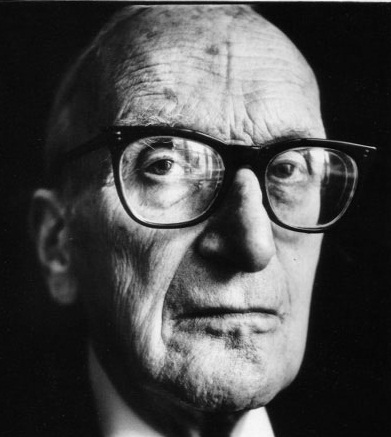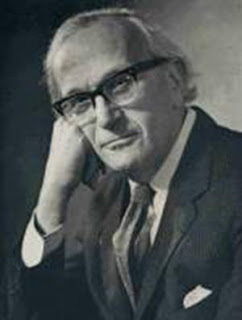<Back to Index>
- Legal Philosopher Herbert Lionel Adolphus Hart, 1907
PAGE SPONSOR



Herbert Lionel Adolphus Hart (18 July 1907 – 19 December 1992) was an influential legal philosopher of the 20th century. He was Professor of Jurisprudence at Oxford University and the Principal of Brasenose College, Oxford. His most famous work is The Concept of Law (1961).
Hart was born in 1907, the son of a prosperous Jewish tailor of German and Polish origin. Educated at Cheltenham College, Bradford Grammar School and at New College, Oxford, Hart took an outstanding First in Classical Greats in 1929.
He became a Barrister and practiced successfully at the Chancery Bar from 1932 to 1940 and was good friends with Richard (later Lord) Wilberforce. He received a Harmsworth Scholarship to the Middle Temple and also wrote literary journalism for the periodical John O'London's Weekly.
During World War II, Hart worked with MI5, a division of British military intelligence, where he renewed Oxford friendships including working with the philosophers Gilbert Ryle and Stuart Hampshire. He did not return to his legal practice after the War, preferring instead to accept the offer of a teaching fellowship (in philosophy, not Law) at New College, Oxford. Hart cites J.L. Austin as particularly influential during this time.
In 1952, he was elected Professor of Jurisprudence at Oxford. He retired from the Chair in 1969 and was succeeded by Ronald Dworkin. He was president of the Aristotelian Society from 1959 to 1960.
Hart married Jenifer Williams, a senior civil servant in the Home Office and, later, Oxford historian at St Anne's College (specializing in the history of the police). Jenifer Hart, a 'sleeper' member of the Communist Party in the 1930s, later came under suspicion of having passed information to the Soviets. The Harts had four children, including a son who was disabled. The marriage contained "incompatible personalities", and Hart confessed to his daughter that "[t]he trouble with this marriage is that one of us doesn't like sex and the other doesn't like food." Jenifer Hart was believed by her contemporaries to have had an affair of long duration with Isaiah Berlin, a close friend of Hart's. Jenifer published her memoirs under the title Ask Me No More in 1998.
There is a description of their household by the writer on religion Karen Armstrong, who lodged with them for a time, in her book The Spiral Staircase.
Many of Hart's former students became important legal, moral, and political philosophers, including Brian Barry, John Finnis, Kent Greenawalt, Neil MacCormick, Joseph Raz, Chin Liew Ten, W. J. Waluchow, and Ronald Dworkin. Hart also had a strong influence on the young John Rawls in the 1950s, when Rawls was a visiting scholar at Oxford shortly after finishing his Ph.D..
Hart revolutionized the methods of jurisprudence and the philosophy of law in the English speaking world. Influenced by John Austin and Ludwig Wittgenstein, Hart brought the tools of analytic, and especially linguistic, philosophy to bear on the central problems of legal theory. Hart's method combined the careful analysis of twentieth century analytic philosophy with the jurisprudential tradition of Jeremy Bentham, the great English legal, political and moral philosopher. Hart's conception of law had parallels to the Pure Theory of Law formulated by Austrian legal philosopher Hans Kelsen, though Hart rejected several distinctive features of Kelsen's theory. Hart drew on Glanville Williams: Glanville Williams demonstrated his skill as a legal philosopher in a five part article, ‘Language and the Law’ and a paper, ‘International Law and the Controversy concerning the word “Law”. In the paper on international law, he sharply attacked the many jurists and international lawyers who had debated whether international law was ‘really’ law. They had been wasting everyone's time, for the question was not a factual one, the many differences between municipal and international law being undeniable, but was simply one of conventional verbal usage, about which individual theorists could please themselves, but had no right to dictate to others. This approach was to be refined and developed by H.L.A. Hart in the last chapter of The Concept of Law (1961) which showed how the use in respect of different social phenomena of an abstract word like “law” reflected the fact that these phenomena each shared, without necessarily all possessing in common, some distinctive features. Glanville had himself said as much when editing a student text on jurisprudence and he had adopted essentially the same approach to ‘The Definition of Crime’.
Hart's most famous work is The Concept of Law, first published in 1961, and with a second edition (including a new postscript) published posthumously in 1994. The book emerged from a set of lectures that Hart began to deliver in 1952, and it is presaged by his Holmes lecture, Positivism and the Separation of Law and Morals delivered at Harvard Law School. The Concept of Law developed a sophisticated view of legal positivism. Among the many ideas developed in this book are:
- A critique of John Austin's theory that law is the command of the sovereign backed by the threat of punishment.
- A distinction between primary and secondary legal rules, where a primary rule governs conduct and a secondary rule allows the creation, alteration or extinction of primary rules.
- A distinction between the internal and external points of view of law and rules, close to (and influenced by) Max Weber's distinction between the sociological and the legal perspectives upon law.
- The idea of the Rule of Recognition, a social rule that differentiates between those norms that have the authority of law and those that do not.
- A late reply (published as a postscript to the second edition) to Ronald Dworkin, who criticized legal positivism in Taking Rights Seriously (1977), A Matter of Principle (1985) and Law's Empire (1986).
With Tony Honoré, Hart wrote Causation in the Law (1959, second edition 1985), which is regarded as one of the important academic discussions of Causation in the legal context.
As a result of his famous debate with Patrick Devlin, Baron Devlin on the role of the criminal law in enforcing moral norms, Hart wrote Law, Liberty and Morality (1963) and The Morality of the Criminal Law (1965). Hart said that he believed Devlin's view of Mill's harm principle as it related to the decriminalization of homosexuality was "perverse". He later stated that he believed the reforms to the law regarding homosexuality that followed the Wolfenden report "didn't go far enough". Despite this, Hart reported later that he got on well personally with Devlin.
Hart gave lectures to the Labour Party on closing tax loopholes which were being used by the "super - rich". Hart considered himself to be "on the Left, the non - communist Left", and expressed animosity towards Margaret Thatcher.